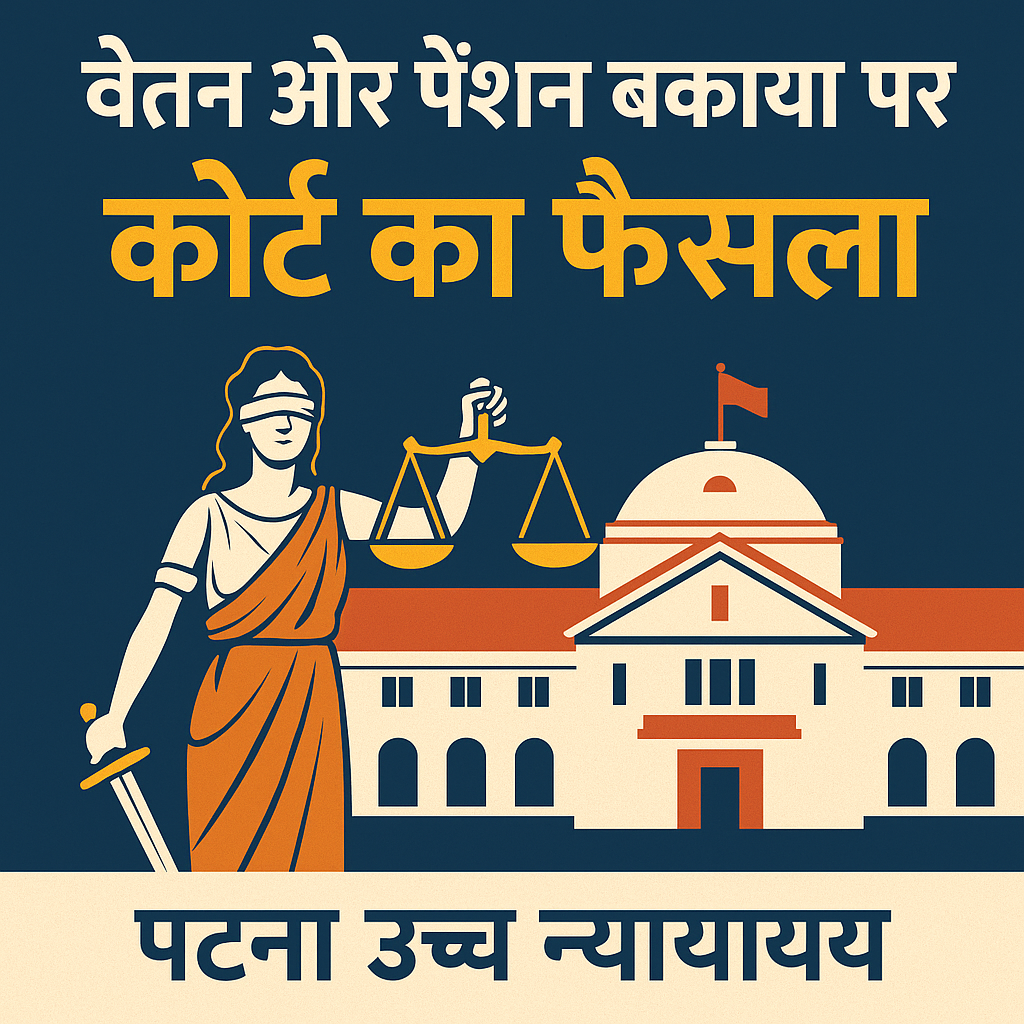Simplified Explanation of the Judgment
In a significant ruling, the Patna High Court has directed the State Government and University authorities to pay the pending dues and revised pension benefits to a retired non-teaching employee of a constituent college under Lalit Narayan Mithila University.
The litigant retired as an Assistant from R.K. College, Madhubani, on 31 December 2010. Post-retirement, he had been awaiting several financial entitlements. Despite clear recommendations from the Statutory Pay Fixation Committee, the dues had not been disbursed due to a conflicting decision by the State Pay Verification Cell, which had downgraded his pay scale.
The petitioner claimed the following unpaid dues:
- Arrear salary from 01.01.1989 to 13.12.2010 (approximately ₹19.79 lakhs),
- Balance of pension, gratuity, and earned leave based on a higher pay scale of ₹15,600–39,100 with Grade Pay ₹7,600,
- Group Insurance Contribution and Dearness Allowance with 9% compound interest, relying on precedent from Prof. Surendra Bahadur Singh v. State of Bihar,
- Interest on delayed payments.
The Statutory Pay Fixation Committee had accepted his entitlement to the higher scale, but the State Pay Verification Cell later reduced it, stating he was only eligible for a lower clerical grade. The university consequently held back the payments.
However, the High Court disagreed with the State’s stand. It cited a prior decision (CWJC No. 22953 of 2018 and connected matters) which held that the Assured Career Progression (ACP) Rules, 2003, along with amendments applicable to State Government employees, also extend to non-teaching university staff.
Importantly, the Court emphasized that there is no substantial functional difference between an “Assistant” and a “Lower Divisional Assistant” in such institutions. It asserted that decisions by the Pay Fixation Committee override the views of the Pay Verification Cell. Furthermore, the State’s own Human Resource Department had earlier unified the pay scales for similar posts in all universities (excluding Patna University) from 01.07.1981.
Accordingly, the Court directed the authorities to release all outstanding dues and recalculate the pension based on the higher pay scale within three months of the order.
Significance or Implication of the Judgment
This ruling affirms the primacy of Pay Fixation Committees over administrative downgrades by Pay Verification Cells. It safeguards the rights of retired non-teaching university employees to receive financial benefits duly approved under statutory schemes.
The judgment serves as a precedent for similarly placed retirees who are denied rightful entitlements due to procedural hurdles or conflicting interpretations. It also underscores the importance of administrative consistency and respect for binding committee decisions.
Legal Issue(s) Decided and the Court’s Decision
- Whether the petitioner was entitled to arrears based on a higher pay scale fixed by the Statutory Pay Fixation Committee
✔ Yes; the Court upheld the fixation and directed disbursement. - Whether the Pay Verification Cell could override the statutory pay fixation
✔ No; the Court held such decisions were subordinate. - Applicability of ACP Rules, 2003 to university non-teaching staff
✔ Yes; affirmed by a prior Coordinate Bench decision. - Entitlement to interest on delayed benefits and GIC contributions
✔ Yes; allowed as per earlier precedent.
Judgments Referred by Parties
- Prof. Surendra Bahadur Singh v. State of Bihar, 2006 SCC OnLine Pat 739
Judgments Relied Upon or Cited by Court
- CWJC No. 22953 of 2018 and batch matters, decided on 18 October 2024
Case Title
CWJC No. 992 of 2020
Case Number
Civil Writ Jurisdiction Case No. 992 of 2020
Citation(s)- 2025 (1) PLJR 245
Coram and Names of Judges
Hon’ble Mr. Justice Bibek Chaudhuri
Names of Advocates and who they appeared for
- Mr. Shashi Bhushan Singh – for the Petitioner
- Mr. Bindhyachal Rai – for L.N. Mithila University
- Mr. Rajeev Ranjan, AC to GP 20, and Mr. Madanjeet Kumar, GP 20 – for the State
Link to Judgment
MTUjOTkyIzIwMjAjOCNO—am1–TUzDyOmzl0=
If you found this explanation helpful and wish to stay informed about how legal developments may affect your rights in Bihar, you may consider following Samvida Law Associates for more updates.









